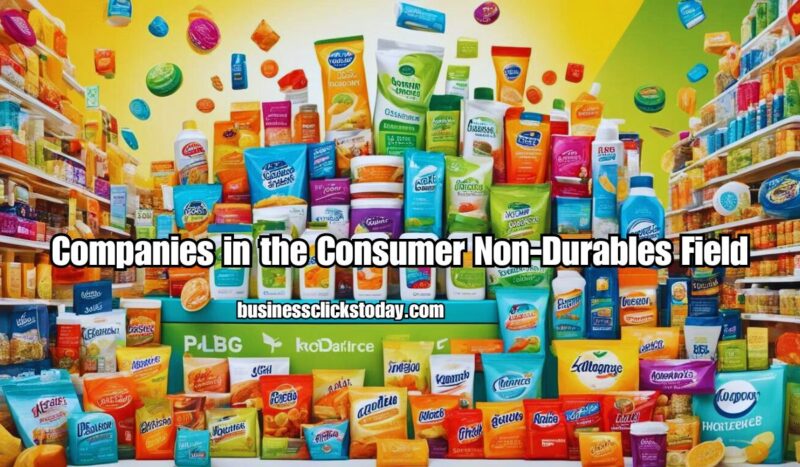In the realm of consumer non-durables, we focus on companies that produce goods intended for immediate or near-immediate use. These products are typically consumed quickly, leading customers to make repeat purchases. If you’re curious about which companies excel in the consumer non-durables field, you’re in the right place. We have conducted extensive research and compiled a list of the top 10 companies in the consumer non-durables field for 2024. Let’s dive into the details.
Top 10 Companies In The Consumer Non-Durables Field 2024
1. Procter & Gamble Company

Market Cap: $345.38 billion
Procter & Gamble (P&G) has been a key player in our daily lives since its founding in 1837 by William Procter and James Gamble. Initially known for soap and candles, P&G gained prominence by supplying the Union Army during the Civil War. Today, P&G offers a wide range of products for health, beauty, and home care, including iconic items like Ivory soap and Crisco. The company is also noted for its social impact initiatives, such as the “Always #LikeAGirl” campaign and “Tide Loads of Hope” disaster relief efforts.
2. Coca-Cola Company

Market Cap: $254.78 billion
Coca-Cola began in 1886 when Dr. John Pemberton created a unique syrup in Atlanta, which was initially sold as a medicinal tonic. The now-famous name and logo were designed by bookkeeper Frank Robinson. From its humble beginnings, Coca-Cola has expanded to become a global leader in beverages, offering over 2,800 products in more than 200 countries. The company’s portfolio extends far beyond the original Coke, encompassing a wide array of drinks.
3. PepsiCo, Inc.

Market Cap: $233.51 billion
PepsiCo, founded in 1898 by Caleb Bradham as Pepsi, became a major force in the food and beverage industry following its 1965 merger with Frito-Lay. PepsiCo’s extensive product lineup includes beloved brands like Lay’s, Doritos, Gatorade, Tropicana, and Quaker Oats. As a prominent player in the consumer non-durables field, PepsiCo faces scrutiny over its environmental impact and product healthiness, with ongoing efforts to address these concerns.
4. Nike, Inc.

Market Cap: $165.23 billion
Nike, originally known as Blue Ribbon Sports, was established in 1964 by Bill Bowerman and Phil Knight. Rebranded as Nike in 1971, the company drew inspiration from the Greek goddess of victory. Today, Nike is a leading name in sportswear, though its products are designed for short-term use, fitting the consumer non-durables category. Facing recent financial challenges and a $2 billion cost-saving initiative, Nike continues to be a significant player in the market.
5. Philip Morris International Inc

Market Cap: $146.05 billion
Philip Morris International (PMI) is a major tobacco company known for its cigarette brands and newer heat-not-burn and vape products. PMI is shifting towards less harmful alternatives due to declining smoking rates and growing health awareness. The company has maintained a strong dividend record since 2008, though questions about its sustainability remain.
6. Anheuser-Busch Inbev SA

Market Cap: $102.29 billion
Anheuser-Busch InBev, formed from the merger of various historic breweries, including AmBev and Anheuser-Busch, is a global leader in beer production. With over 630 brands, including Budweiser, Corona, and Stella Artois, AB InBev operates worldwide. Its products are designed for immediate consumption, categorizing it firmly within the consumer non-durables sector.
7. Mondelez International, Inc.

Market Cap: $98.57 billion
Mondelez International emerged from the 2012 spin-off of Kraft Foods’ grocery business. Originally known for ice cream and cheese, Mondelez now focuses on snacks, with popular brands like Oreo, Cadbury, and Toblerone. The company’s products, intended for quick consumption, align with the consumer non-durables field.
8. Unilever PLC

Market Cap: $95.04 billion
Unilever, formed in 1929 from a merger between Dutch margarine producers and British soapmakers, boasts a diverse brand portfolio, including Dove, Ben & Jerry’s, and Axe. With origins in the 1800s, Unilever’s products, such as toothpaste and ice cream, are used quickly, fitting the consumer non-durables category.
9. Altria Group, Inc.

Market Cap: $71.35 billion
Altria Group, a major player in the North American tobacco market, is best known for its Marlboro brand. As smoking declines and vaping rises in popularity, Altria is adapting by investing in vaping products. Despite challenges, the company continues to offer substantial dividends, attracting investors seeking income.
10. Diageo PLC

Market Cap: $63.23 billion
Diageo, established in 1997 from the merger of Guinness and Grand Metropolitan, is a leading global spirits company. With a range of products including Guinness, Smirnoff, and Baileys, Diageo’s offerings are intended for immediate enjoyment, aligning with the consumer non-durables field. The company has also expanded its portfolio through acquisitions of brands like Seagram’s and Don Julio.
Conclusion
So there you have it—a comprehensive look at the top companies in the consumer non-durables field for 2024. If you’ve followed along, you now have a solid list of potential investment opportunities. However, it’s essential to conduct your own in-depth analysis before making any investment decisions. Each company’s performance and market position can change, so staying informed and making well-researched choices is crucial for investing success in the consumer non-durables field.















